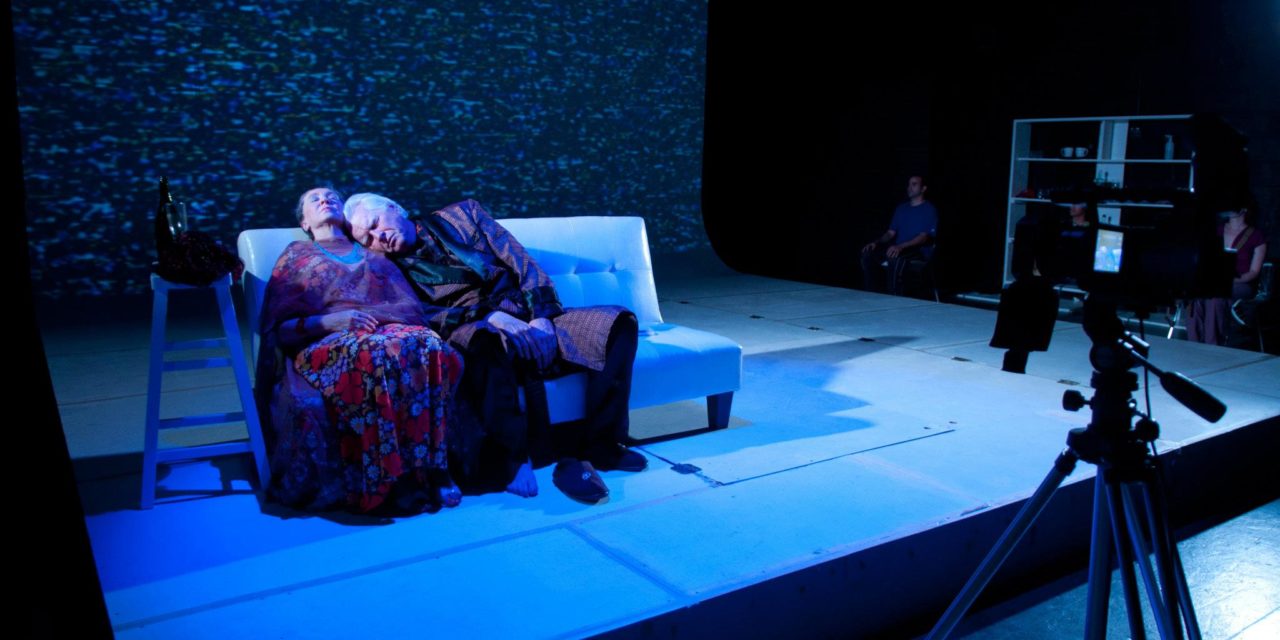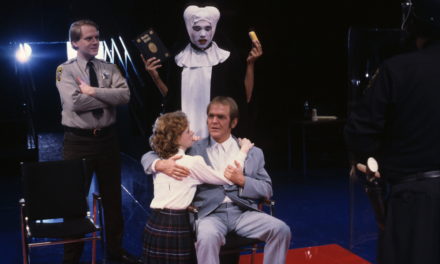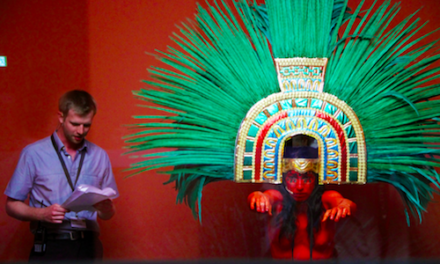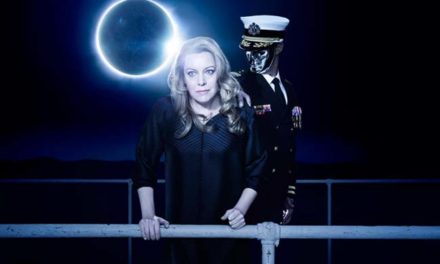An interview with Graham Schmidt, artistic director of Austin’s Breaking String Theater. Schmidt directed a reading for The Lark’s 2017 Russia/United States Playwright Exchange.
Over the past decade, you’ve been at the forefront of bringing contemporary Russian-language drama to American audiences, particularly through your Austin-based theatre company Breaking String Theater.
Here I must offer some context. Producing the New Russian Drama Festival from 2011 to 2013 was one of the thrills of my professional life, and I’m honored to be offered such high praise. That said, there are several organizations that have acted as conduits for artistic exchange with Russia, and continue to do so:
- The Eugene O’Neill Theater Center has been active in bringing over Russian playwrights for developmental work with their scripts and has sent hundreds of undergraduate students to Russia on semester-long study programs at the Moscow Art Theatre.
- The Center for International Theatre Development, led by Philip Arnoult, blazed trails for cultural exchange with the USSR, and did the translation, networking, and investigative work that brought New Russian Drama to America.
- The Lark in New York, where I worked, has workshopped dozens of translations of contemporary Russian plays through its 10-year-old Russia/US Playwright Exchange.
In 2015, Breaking String went on a hiatus so that I could pursue an MFA in Directing from UT-Austin, and as a graduate student, I’ve focused intensely on new and devised American work. That said, my work developing Russian plays continues to inform who I am as an artist!
How did you come to the contemporary Russian theatre?
Everything started for me with my friendship with John Freedman. I had been an avid reader of John’s Theatre Plus blog in the Moscow Times since 2004. John was (is!) in this unique position of writing about, interpreting and championing Russian theatre for English-speaking audiences. He has fantastic insights and a huge wealth of knowledge, so I loved his dispatches. In 2005, when I was in Moscow, I looked him up, and he invited me over to his apartment and introduced me to a few of his friends. I still remember how warmly he took me in – he and Oksana’s truly Russian hospitality was unforgettable. John held forth on my beloved Uncle Vanya with rare insight for an hour at least, and his wife, Oksana Mysina, brought me some fresh grapes. Meeting a famous actress and a brilliant writer/critic at the same time was a pretty heady experience for a young theatre-maker and Russophile.
I followed some of the scholarship and popular coverage of New Russian Drama in English. Then when my Russian got strong enough, I read everything I could in Russian. There was an issue of Theater in 2006 that focused exclusively on New Russian Drama, and John published exhaustively, both in scholarly journals and in Theatre Plus. I was also spending some time in Russia; from 2004 through 2009, I lived there for two years, all told, and I saw everything I could. The first show I saw in Russia was actually Kirill Serebrennikov’s Plasticine at the Playwright and Director Center, and it was absolutely mind-blowing. Just one of those productions that crack open what theatre can do.
In 2007, I’d founded Breaking String, a theatre company focused on Chekhov plays, and by 2009 my collaborators and I decided to expand our programming. Around that time, John and Philip Arnoult were convening a conference at Towson University around New Russian Drama, and they invited me. So there I was, the head of a tiny, young theatre company from Austin, Texas, and I got to hang out with some real luminaries of the American theatre community. John and I hatched the idea of a festival of New Russian Drama based on the model that Philip had created at Towson. The rest is history.
Why the focus on Russian theatre? How does it speak to American audiences?
I had a sense that the fringe-theatre community in Russia had a lot to say to the fringe-theatre community in America. I think Austinites, due to our geographic isolation and the fact that we’re off the beaten path culturally in the US, have a thirst for direct contact with work from the world’s theatre capitals. So, there was a natural curiosity that I tapped into. I also think that there was a thaw in relations between the US and Russia and that between about 2010 and 2013 there was a sense of possibility and potential between our countries, that maybe we could interact in a new, non-hostile way. I wanted to be a part of that and to share all I’d learned and fallen in love with during my trips to Russia.
Can you share a favorite experience or a favorite play from your years of directing Russian plays?
There were so many wonderful experiences that it’s hard to single one out. Probably my favorite play was Maksym Kurochkin’s The Schooling Of Bento Bonchev, which is this strange, beautiful play about a dystopian near-future in which love has been declared a sentimental relic of human evolution. It’s fun and goofy and biting and absolutely, radically sincere, which is a feature of Max’s plays. It was also a production in which I felt I grew as a director, so that was terrific.
What changes have you observed in the Russian theatre landscape since you began your engagement with contemporary Russian theatre?
Obviously, the blacklisting of artists started in about 2014, and Theater.Doc, a hub for New Russian Drama, has been shut down a couple of times. I think the tense political climate has been a huge change, the naked aggression of the state and its paranoid hostility toward even the tiniest threats to its image/control over public opinion, that’s been dramatically different.
I also think that a lot of the artists who were at the vanguard of the New Russian Drama movement matured. Some of them stopped writing plays and do more work with TV or film; that happens with American playwrights, too. There’s just more money in it, and they have families to support, retirements to plan (those who can). Some of the writers whom I’ve been following for years have really matured, as well. I think that Misha Durnenkov is a far different writer today than he was ten years ago. He’s also become a leader in the Moscow fringe theatre community; he runs the Lyubimovka new play festival every year. I get the sense that new writers are emerging at as fast a clip as ever, though.
In some ways, I’ve changed as much as Russian theatre has. In recent years, I’ve expanded the scope of my work, so that I look at a lot more new American plays and plays from the American canon. Since this is where I want to make my artistic home, I’ve become much more invested in the history, legacy, and continued life of the American theatre.
You recently directed a reading of Mikhail (Misha) Durnenkov’s The War Has Not Yet Started at The Lark. What is this play about?
Misha wrote it in response to Russia’s annexation of Ukraine, and it depicts an atmosphere of constant anxiety, aggression, and fear, which from time to time erupts in quotidian interactions. For me, it felt urgent and familiar, because ever since the presidential election, I’ve sensed the same atmosphere here in America. It’s as if we’ve been traumatized, and we constantly experience and respond to this trauma, even when we’re not thinking about it.
The play reminds me of Caryl Churchill’s Love And Information in that it comprises twelve different scenes with characters that don’t necessarily repeat, and the scene order is flexible. Each scene establishes a “normal” platform with an interaction that feels drawn from everyday life, then ends with a vicious/funny/weird/ghastly turn. The accumulated effect is profound and haunting.
Had you worked with Durnenkov in the past? How familiar were you with his body of playwriting, and can you describe his style for us?
This is the first time I’ve ever worked with Misha, though of course, I’d heard a lot about him. He was absolutely wonderful to be in the room with. His theatrical instincts are absolutely on-point, and he’s just this wonderful, quiet, supportive presence in the room. I couldn’t have had more fun, was so lucky to be assigned his play.
Can you talk about the rehearsal process for this play?
We had about 25 hours over the course of the week, split into four rehearsals. On the first day, the company assembled and read each play, (the other fantastic plays in the program were Rinat Tashimov’s Shaitan Lake and Yulia Tupikina’s Inhale-Exhale), then we all broke for rehearsals. Misha’s play calls for three actors minimum, but we workshopped it with six, just to see what would happen. My hunch was that it would give the play a sense of a more populous, more expansive world, and become less about the actors’ transformations (there are twelve scenes and each has up to three performers, so there are something like twenty-five distinct roles), and more about this strange, hostile world that Misha has created. That really came off well. We were aided by some of the best actors I’ve ever worked with: Robert Stanton, Clark Jackson, Mary Bacon, Ethan Hova, Mia Katigbak, and Ali Ali. They were just superb, as talented and rigorous performers as you’ll find anywhere, and they really made the play sing. We all fell in love with it.
How did The Lark’s audience respond to Durnenkov’s play and the others in this year’s festival?
It was received astonishingly well, I should think. We were the last play to be read before an audience, and the packed house received it ecstatically. In the talkback, we discussed the rehearsal process, the translation process, and some of the ways in which the play resonated with American audiences.
On The Lark’s blog, Sasha Sharova (of The Lark) and Evgeny Kazachkov (of Moscow’s Lubimovka Festival) spoke about how this sort of cultural exchange is ever more important in light of the growing tensions between Russia and the United States. How did this sense of urgency affect the rehearsal process, the audience engagement, or the conversations surrounding the readings?
I am not sure what anyone else was feeling, but I absolutely had a sense that this opportunity for cultural exchange was extraordinary. These are difficult times for the Russian theatre, and to have a play that just blew people away, confirmed for me the necessity of continuing this work, and the resilience, courage, and heart of Russian theatre artists.
What are your current directing projects?
I’m developing a documentary theatre piece about physicians and their grief. The workshop performances open next week. I’m also working on a piece about film noir and its portrayal of masculinity through the character of the noir detective, and how this image (among many others) affects boys as they’re socialized into manhood.
What Russian plays or playwrights are you eager to stage in the United States next?
We’re on the hunt for a theatre to realize The War Has Not Yet Started in production, so hopefully, you’ll be hearing about Misha’s play being produced somewhere very soon.
This post was written by the author in their personal capacity.The opinions expressed in this article are the author’s own and do not reflect the view of The Theatre Times, their staff or collaborators.
This post was written by Jessica Hinds-Bond.
The views expressed here belong to the author and do not necessarily reflect our views and opinions.


















